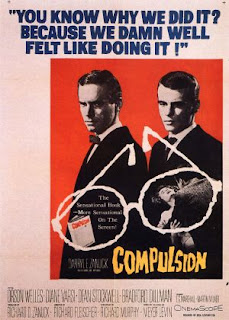Compulsion
The case of Leopold and Loeb has so fascinated us in the over ninety years since they committed murder that it has spawned several works of fiction and nonfiction. The most famous is Alfred Hitchcock's Rope, but the most accurate is Richard Fleischer's 1959 film Compulsion, which changes the names but basically gets the facts correct. It also has the bonus of Orson Welles as the Clarence Darrow character.
In the film, Judd Steiner (Dean Stockwell) and Artie Strauss (Bradford Dillman) are brilliant college students--they are both under twenty but in graduate school. They subscribe to the theories of Nietzsche, and believe that due to their superior intellect they do not need to follow the laws of the common man. They plan a murder of a boy just to prove their point. But Steiner leaves his glasses behind.
The film is almost a docudrama, though it seems to have been intended for part of a drive-in double bill with it's horror font title card. But a lot of good people were involved. Dillman, Stockwell, and Welles shared the Best Actor award at Cannes that year. E.G. Marshall plays the prosecuting attorney. Richard Anderson is Stockwell's disapproving older brother, and Edward Binns plays a newspaper reporter. In the one nod to fiction, a character played by Martin Milner, who is friends to the killers but also a cub reporter, is the one that finds the glasses. I also believe a character played by Diane Varsi is added just to give the film a little sex, as Stockwell takes her out birdwatching but ends up attacking her.
Leopold and Loeb were Jewish, which is not made reference to except in their names, and their sexual orientation was suspect. It appears that Dillman's character was gay, and he got his kicks by "ordering" Stockwell to do things. Stockwell's sexuality is much more nuanced, though the film dares go there when Welles pointedly asks him if he has ever dated a girl.
Compulsion mercilessly does not show the murder or the young boy at all, other than as a body under a sheet at the coroner's office. Dillman is so fascinated by it all that he actually aids the investigation and gives the cops false leads. But Marshall, who smells a rat, eventually catches them in an error on their alibi, and is able to associate the glasses with Stockwell.
As in real life, Welles decided to plead the boys guilty, appealing only to the judge to try to spare the boys' lives. Darrow gave a twelve-hour closing argument. We only see about ten minutes of it, but it's bravura acting by Welles and terrific direction by Fleischer.
Other than an actual documentary, Compulsion is as close to getting the Leopold and Loeb case right, and is also a damn fine film.
In the film, Judd Steiner (Dean Stockwell) and Artie Strauss (Bradford Dillman) are brilliant college students--they are both under twenty but in graduate school. They subscribe to the theories of Nietzsche, and believe that due to their superior intellect they do not need to follow the laws of the common man. They plan a murder of a boy just to prove their point. But Steiner leaves his glasses behind.
The film is almost a docudrama, though it seems to have been intended for part of a drive-in double bill with it's horror font title card. But a lot of good people were involved. Dillman, Stockwell, and Welles shared the Best Actor award at Cannes that year. E.G. Marshall plays the prosecuting attorney. Richard Anderson is Stockwell's disapproving older brother, and Edward Binns plays a newspaper reporter. In the one nod to fiction, a character played by Martin Milner, who is friends to the killers but also a cub reporter, is the one that finds the glasses. I also believe a character played by Diane Varsi is added just to give the film a little sex, as Stockwell takes her out birdwatching but ends up attacking her.
Leopold and Loeb were Jewish, which is not made reference to except in their names, and their sexual orientation was suspect. It appears that Dillman's character was gay, and he got his kicks by "ordering" Stockwell to do things. Stockwell's sexuality is much more nuanced, though the film dares go there when Welles pointedly asks him if he has ever dated a girl.
Compulsion mercilessly does not show the murder or the young boy at all, other than as a body under a sheet at the coroner's office. Dillman is so fascinated by it all that he actually aids the investigation and gives the cops false leads. But Marshall, who smells a rat, eventually catches them in an error on their alibi, and is able to associate the glasses with Stockwell.
As in real life, Welles decided to plead the boys guilty, appealing only to the judge to try to spare the boys' lives. Darrow gave a twelve-hour closing argument. We only see about ten minutes of it, but it's bravura acting by Welles and terrific direction by Fleischer.
Other than an actual documentary, Compulsion is as close to getting the Leopold and Loeb case right, and is also a damn fine film.



Comments
Post a Comment